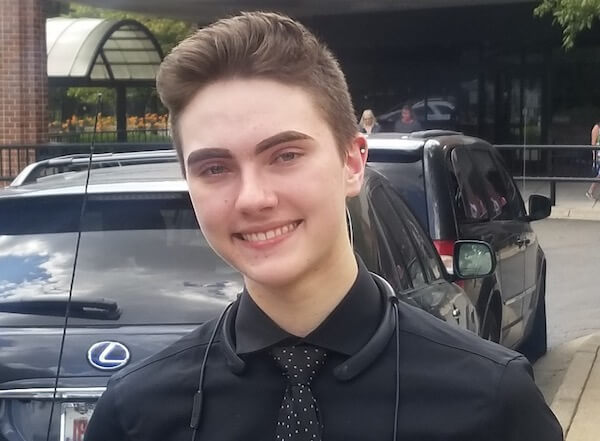By Stephanie Duesing
In January of 2017, my family and I discovered that our 15-year-old son Sebastian — a straight-A honor student, a painter, a sculptor, a potter and a water polo-player — was almost completely blind. We were going through old photos and realized that he couldn’t recognize himself or anyone else in any of the pictures. We then discovered that Sebastian had taught himself to count his steps and turns as a toddler, and had been navigating our own home as a blind person would, all his life. Sebastian had also taught himself early on to process his vision verbally, using words to help him “see.” The only things he could see for real were letters and numbers. That’s why nobody knew he was blind. Not even him.
An epic struggle to get a medical diagnosis and basic services ensued. The answer we heard over and over again, from psychologists, neurologists, vision therapists and Sebastian’s trusted pediatrician was, “I cannot help you.”
Countless other parents of children with disabilities that are not readily apparent or easily understood know how it feels to come up against one dead end after the other when searching for the help they need. And in this age of coronavirus pandemic, where services considered nonessential are being curtailed, these same families may feel like they’ve been forgotten altogether.
It took almost six months, seeing one specialist after another, for my family to learn that Sebastian is one of tens of thousands of people in the United States alone who has cerebral/cortical visual impairment (CVI) and to get him the basic services he needs.
CVI was identified as the number one cause of visual impairment in the developed world more than ten years ago and still doesn’t have a diagnostic code.
Here are my tips for how parents of children who have any disabilities can become better advocates for their children when professionals aren’t taking your concerns seriously — or aren’t listening at all:
Trust yourself
You know your child better than anyone else in the world. If you are seeing behaviors or symptoms that concern you, trust your instincts. Sebastian’s symptoms of his visual impairment were very subtle when he was little, but once we figured it out, I knew without a doubt what his condition was. That certainty gave me confidence, and that confidence kept me going against all odds.
Listen to your child
Listening to your child doesn’t just mean hearing what they tell you with words. It means paying attention to what they may not be able to say. Crying is communication. A child’s fear, anxiety, anger or pain is as real to them as yours is to you. If your child is verbal, talk to them about what they are experiencing and what it is that distresses them. If the child is too young for conversations, or is nonverbal, close examination of behavioral patterns is necessary.
Be persistent
Doctors are only human and they only know what they’ve been trained to know. As we are discovering with the COVID-19 infection, new infections and medical conditions are discovered regularly, and many older ailments are still poorly understood. If one medical provider is unable to answer your questions or provide your child with the necessary care, find another. Some individuals are more curious and on top of the latest research than others.
Document everything
I have 36 single-spaced, typed pages of documentation of what we went through to get a diagnosis for my son’s vision impairment. I wrote down everything of importance that I could remember about each medical appointment, as well as discoveries we made about Sebastian’s visual processing along the way.
Your persistence can be the difference between getting help for your child or not.
Expand your search beyond the medical community
Different professions vary in how quickly they educate their members on new medical and scientific information. Educators, occupational therapists, science researchers, speech pathologists or any other related field may sometimes be a parent’s best resource. We finally got help thanks to Lukas Franck, the senior consultant at The Seeing Eye guide dog organization who helped connect us to the best vision and brain experts in the world.
Be prepared for the long haul
It took us 15 months to complete our medical journey. We saw approximately 20 different doctors without success. A research study in Paris and another at the Harvard CVI Laboratory for Visual Neuroplasticity finally led us to a conclusive medical diagnosis of CVI from Dr. Barry Kran at the end of March, 2018. The head of optometrics from the New England Eye Low Vision Clinic, Dr. Kran is a leader in the field of cerebral/cortical visual impairment, and was and continues to be an incredible support for our family.
If you are having trouble finding medical or educational assistance for your child, trust your gut, listen to your child, don’t give up, expand your search for help, and be prepared to go the distance. Parents of children who have disabilities are the bravest, most persistent and knowledgeable people in the world. Your knowledge of your child is profound, crucial and irreplaceable. Finding professionals who understand this fact and are willing to listen is half the battle.

Stephanie Duesing’s book, Eyeless Mind: A Memoir About Seeing and Being Seen on Amazon!
Stephanie Duesing is devoted to raising awareness of Cerebral/Cortical-Visual Impairment (CVI) and advocating for patients with this prevalent but largely unacknowledged cause of visual impairment. A music educator, Stephanie has taught elementary and middle school music and chorus, as well as private voice and piano. She also opened her own Musikgarten studio, where she taught classes for families with babies, toddlers and preschoolers. She’s a graduate of University of Illinois at Urbana-Champaign and lives in the western suburbs of Chicago. Learn more on her website at www.stephanieduesing.com.

